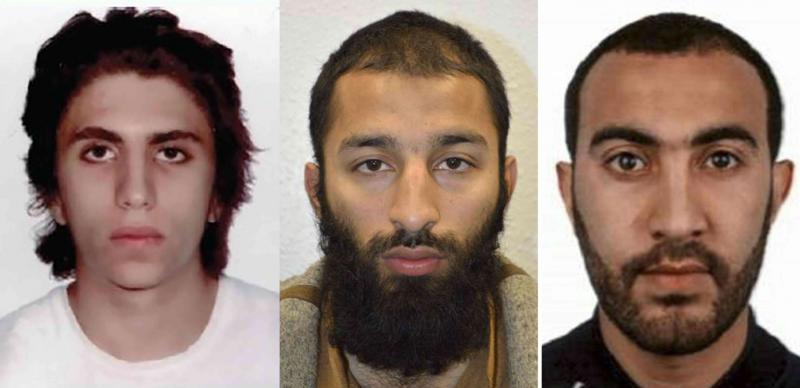The terrible link between jihadists and Islamophobes

An alarming pattern. A combination of pictures shows (L-R) Youssef Zaghba, Khuram Shazad Butt and Rachid Redouane, believed by police to be the three attackers in the June 3 terror attack on London Bridge. (AFP)
In her book “Home Grown: How Domestic Violence Turns Men Into Terrorists,” human rights campaigner Joan Smith makes the case that “there is a close link between private and public violence.”
What do jihadists and right-wing killers have in common other than the fact they committed an act of public violence? Is there an unsuspected link between those who perpetrated attacks in the name of Islam in Britain, France and the United States and those who have attacked Muslims in the West? According to human rights campaigner Joan Smith, all were men with some history of domestic violence, mostly as perpetrators but sometimes as victims.
Many were wife beaters, misogynists and control freaks who terrorised the women in their lives. Some, such as the French-Algerian Kouachi brothers who killed the staff of Charlie Hebdo magazine in 2015, suffered at the hands of violent fathers. There is a “close link between private and public violence,” Smith writes in “Home Grown: How Domestic Violence Turns Men into Terrorists.”
The title — just like Smith’s premise — is a thought-provoking assertion. If one goes by Smith’s argument, it is time to rethink counterterrorism strategies because a person’s ideology and faith — or lack of it — doesn’t matter quite as much as their record of violence against women.
Does the argument hold water? Smith makes her case through an examination of disparate incidents of terrorism going back to 2013. In that year, the Chechen-American brothers Dzhokhar and Tamerlan Tsarnaev detonated bombs at the Boston Marathon, killing three people and injuring several hundred. Tamerlan Tsarneav, Smith writes, was prone to violence against women, having battered a girlfriend and abused his wife.
The year after the Boston bombings there was the siege of a Sydney cafe, which was treated as a terrorist incident. The perpetrator, an Iranian-Australian man, sustained a 16-hour standoff with police but it ended with the death of several people, including the perpetrator. The attacker made confused and scattered claims that suggested a perverted view of his religious duty but Smith says the real giveaway was his “history of domestic and sexual violence.”
She discerns the same pattern in the lives of other jihadists: The wife of Tunisian Mohamed Lahouaiej-Bouhlel, who killed 85 people when he drove a lorry onto the pavement of the Promenade des Anglais in Nice on Bastille Day 2016, had filed for divorce listing abuse.
Khalid Masood, the British Muslim convert who drove a car into pedestrians on London’s Westminster Bridge and then fatally stabbed a policeman in March 2017, had “an extensive history of domestic abuse.”
Salman Abedi, the British Libyan who detonated a suicide bomb in the Manchester Arena concert venue in May 2017, killing 22 mainly pubescent girls, had once punched a female fellow student for wearing a short skirt.
The wife of Moroccan Rachid Redouane, one of three men who attacked pedestrians on London Bridge in June 2017, complained of “violent abuse.”
Smith notes the similarities in the troubled and troubling lives of those at the other end of the religious and race spectrum, for instance violent white Christian Islamophobes such as Darren Osborne. In June 2017, Osborne drove his car into a crowd outside London’s Finsbury Park mosque, killing one and injuring nine. Osborne, says Smith, was no more than “a domestic tyrant…(an) abuser with a lengthy record of violent crime” against the two women he married and many others.
The checklist above is dismal and just about repetitive enough to suggest that Smith is right to see some connection between public acts of violence and private ones in the unhappy family homes of terrorists.
Yet, there is a decided sense of overreach in the claim that domestic violence should be seen as a warning of terrible public atrocities to come. Smith writes that domestic violence is a “useful apprenticeship” for men who become infamous for “crushing passers-by under the wheels of an SUV or stab strangers with kitchen knives.”
Perhaps. But all that is really established is the likelihood a violent person will continue to behave that way. This study reiterates something that has long been known — that those who experience violence often perpetuate it. This applies to individuals as much as to communities and whole cultures.
As the cliche goes: Violence begets violence. I’m not sure that is a counterterrorism strategy but it does add another dimension to the debate over the roots of terrorist violence.
Originally published in The Arab Weekly

